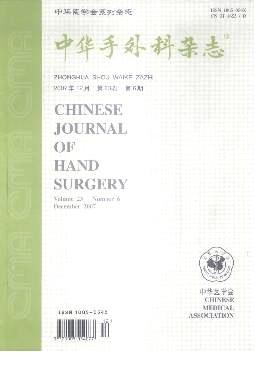The study of inhibitory effect of compound angelica injection on fibroblast proliferation in tendon adhesion
引用次数: 0
Abstract
Objective To investigate the inhibitory effect and mechanism of compound angelica injection on the proliferation of human fibroblasts. Methods Compound angelica injection with 10, 20, 40 and 80 mg/ml concentrations was administered on human fibroblasts respectively. MTS method was used to detect the proliferation level of human fibroblasts after 48 and 72 hours. The expression level of TGF-β1 was detected by ELISA. Real-time PCR was used to detect the change level of TGF-β1 after compound angelica injection. Results MTS results showed that the proliferation of fibroblasts was inhibited in 20, 40, 80 mg/ml group (P<0.05); real-time PCR results showed that the transcription level of TGF-β1 in fibroblasts decreased in 10, 20, 40 mg/ml group compared with the control group 48 hours after the treatment of compound angelica injection (P<0.05). ELISA results showed that the expression of TGF-β1 was inhibited with the increase of drug concentration 48 hours after the treatment of compound angelica injection (P<0.05). Conclusion Compound angelica injection can inhibit the expression of TGF-β1 in human fibroblasts, suggesting that it can inhibit the proliferation of human fibroblasts, and the inhibition level is concentration-dependent after a certain period of time, which may affect the occurrence of tendon adhesion. Key words: Fibroblasts; Angelica sinensis; Tendon adhesion; TGF-β1复方当归注射液抑制肌腱粘连成纤维细胞增殖的研究
目的探讨复方当归注射液对人成纤维细胞增殖的抑制作用及其机制。方法分别以10、20、40、80 mg/ml浓度的复方当归注射液作用于人成纤维细胞。MTS法检测人成纤维细胞48h和72h后的增殖水平。ELISA法检测TGF-β1的表达水平。采用Real-time PCR检测复方当归注射液后TGF-β1水平的变化。结果MTS结果显示,20、40、80 mg/ml组成纤维细胞增殖受到抑制(P<0.05);real-time PCR结果显示,复方当归注射液治疗48 h后,10、20、40 mg/ml组大鼠成纤维细胞中TGF-β1转录水平较对照组降低(P<0.05)。ELISA结果显示,复方当归注射液治疗48 h后,TGF-β1的表达随药物浓度的升高而受到抑制(P<0.05)。结论复方当归注射液能抑制TGF-β1在人成纤维细胞中的表达,提示其能抑制人成纤维细胞的增殖,且一定时间后抑制水平呈浓度依赖性,可能影响肌腱粘连的发生。关键词:成纤维细胞;当归;肌腱粘连;转化生长因子-β1
本文章由计算机程序翻译,如有差异,请以英文原文为准。
求助全文
约1分钟内获得全文
求助全文

 求助内容:
求助内容: 应助结果提醒方式:
应助结果提醒方式:


